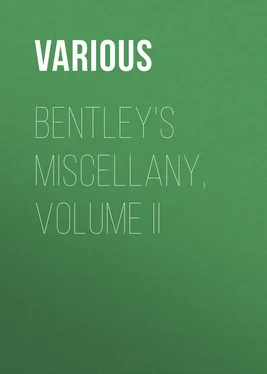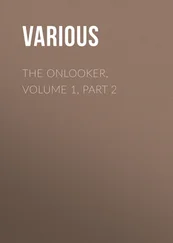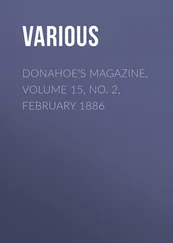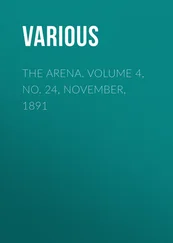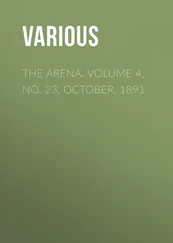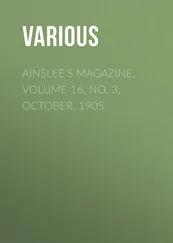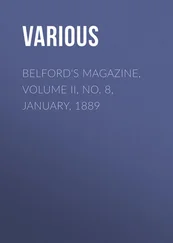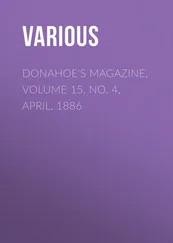Various - Bentley's Miscellany, Volume II
Здесь есть возможность читать онлайн «Various - Bentley's Miscellany, Volume II» — ознакомительный отрывок электронной книги совершенно бесплатно, а после прочтения отрывка купить полную версию. В некоторых случаях можно слушать аудио, скачать через торрент в формате fb2 и присутствует краткое содержание. Издательство: Иностранный паблик, Жанр: foreign_antique, foreign_prose, на английском языке. Описание произведения, (предисловие) а так же отзывы посетителей доступны на портале библиотеки ЛибКат.
- Название:Bentley's Miscellany, Volume II
- Автор:
- Издательство:Иностранный паблик
- Жанр:
- Год:неизвестен
- ISBN:нет данных
- Рейтинг книги:3 / 5. Голосов: 1
-
Избранное:Добавить в избранное
- Отзывы:
-
Ваша оценка:
- 60
- 1
- 2
- 3
- 4
- 5
Bentley's Miscellany, Volume II: краткое содержание, описание и аннотация
Предлагаем к чтению аннотацию, описание, краткое содержание или предисловие (зависит от того, что написал сам автор книги «Bentley's Miscellany, Volume II»). Если вы не нашли необходимую информацию о книге — напишите в комментариях, мы постараемся отыскать её.
Bentley's Miscellany, Volume II — читать онлайн ознакомительный отрывок
Ниже представлен текст книги, разбитый по страницам. Система сохранения места последней прочитанной страницы, позволяет с удобством читать онлайн бесплатно книгу «Bentley's Miscellany, Volume II», без необходимости каждый раз заново искать на чём Вы остановились. Поставьте закладку, и сможете в любой момент перейти на страницу, на которой закончили чтение.
Интервал:
Закладка:
I consider him to be meant as the character of an unlucky man, – a man who, with the best views and fairest intentions, is perpetually so unfortunate as to fail in every aspiration, and, while exerting himself to the utmost in their behalf, to involve all whom he holds dearest in misery and ruin. At the commencement of the play an idle quarrel among some low retainers of the rival families produces a general riot, with which he has nothing to do. He is not present from beginning to end; the tumult has been so sudden and unexpected, that his father is obliged to ask
And yet it is this very quarrel which lays him prostrate in death by his own hand, outside Capulet's monument, before the tragedy concludes. While the fray was going on, he was nursing love-fancies, and endeavouring to persuade himself that his heart was breaking for Rosaline. How afflicting his passion must have been, we see by the conundrums he makes upon it:
"Love is a smoke raised with the fume of sighs;
Being purged, a fire sparkling in lovers' eyes;
Being vex'd, a sea nourish'd with lovers' tears. 6 6 Is there not a line missing?
What is it else? – a madness most discreet,
A choking gall, and a preserving sweet." —
And so forth. The sorrows which we can balance in such trim antitheses do not lie very deep. The time is rapidly advancing when his sentences will be less sounding.
"It is my lady; oh, it is my love!
O that she knew she were!" —
speaks more touchingly the state of his engrossed soul than all the fine metaphors ever vented. The supercilious Spartans in the days of their success prided themselves upon the laconic brevity of their despatches to states in hostility or alliance with them. When they were sinking before the Macedonians, another style was adopted; and Philip observed that he had taught them to lengthen their monosyllables. Real love has had a contrary effect upon Romeo. It has abridged his swelling passages, and brought him to the language of prose. The reason of the alteration is the same in both cases. The brevity of the Spartans was the result of studied affectation. They sought, by the insolence of threats obscurely insinuated in a sort of demi-oracular language, to impose upon others, – perhaps they imposed upon themselves, – an extravagant opinion of their mysterious power. The secret was found out at last, and their anger bubbled over in big words and lengthened sentences. The love of Rosaline is as much affected on the part of Romeo, and it explodes in wire-drawn conceits.
"When the devout religion of mine eye
Maintains such falsehood, then turn tears to fires;
And those who often drown'd could never die,
Transparent heretics, be burnt for liars.
One fairer than my love! – the all-seeing sun
Ne'er saw her match since first the world begun."
It is no wonder that a gentleman who is so clever as to be able to say such extremely fine things, forgets, in the next scene, the devout religion of his eye, without any apprehension of the transparent heretic being burnt for a liar by the transmutation of tears into the flames of an auto da fe . He is doomed to discover that love in his case is not a madness most discreet when he defies the stars; there are then no lines of magnificent declamation.
"Is it even so? then I defy you, stars!
Thou knowest my lodging: get me ink and paper,
And hire post-horses; I will hence to-night."
Nothing can be plainer prose than these verses. But how were they delivered? Balthazar will tell us.
"Pardon me, sir; I dare not leave you thus:
Your looks are pale and wild, and do import
Some misadventure."
Again, nothing can be more quiet than his final determination:
It is plain Juliet, – unattended by any romantic epithet of love. There is nothing about "Cupid's arrow," or "Dian's wit;" no honeyed word escapes his lips, – nor again does any accent of despair. His mind is so made up, – the whole course of the short remainder of his life so unalterably fixed, that it is perfectly useless to think more about it He has full leisure to reflect without disturbance upon the details of the squalid penury which made him set down the poor apothecary as a fit instrument for what now had become his "need;" and he offers his proposition of purchasing that soon-speeding gear which is to hurry him out of life, with the same business-like tone as if he were purchasing a pennyworth of sugar-candy. When the apothecary suggests the danger of selling such drugs, Romeo can reflect on the folly of scrupling to sacrifice life when the holder of it is so poor and unfortunate. Gallant and gay of appearance himself, he tells his new-found acquaintance that bareness, famine, oppression, ragged misery, the hollow cheek and the hungry eye, are fitting reasons why death should be desired, not avoided; and with a cool philosophy assures him that gold is worse poison than the compound which hurries the life-weary taker out of the world. The language of desperation cannot be more dismally determined. What did the apothecary think of his customer as he pocketed the forty ducats? There you go, lad, – there you go, he might have said, – there you go with that in your girdle that, if you had the strength of twenty men, would straight despatch you. Well do I know the use for which you intend it. To-morrow's sun sees not you alive. And you philosophise to me on the necessity of buying food and getting into flesh. You taunt my poverty, – you laugh at my rags, – you bid me defy the law, – you tell me the world is my enemy. It may be so, lad, – it may be so; but less tattered is my garment than your heart, – less harassed by law of one kind or another my pursuit than yours. What ails that lad? I know not, neither do I care. But that he should moralise to me on the hard lot which I experience, – that he, with those looks and those accents, should fancy that I, amid my beggarly account of empty boxes, am less happy than he, – ha! ha! ha! – it is something to make one laugh. Ride your way, boy: I have your forty ducats in my purse, and you my drug in your pocket. And the law! Well! What can the executioner do worse to me in my penury and my age than you have doomed for yourself in your youth and splendour. I carry not my hangman in my saddle as I ride along. And the curses which the rabble may pour upon my dying moments, – what are they to the howling gurgle which, now rising from your heart, is deafening your ears? Adieu, boy, – adieu! – and keep your philosophy for yourself. Ho! ho! ho!
But had any other passion or pursuit occupied Romeo, he would have been equally unlucky as in his love. Ill fortune has marked him for her own. From beginning to end he intends the best; but his interfering is ever for the worst. It is evident that he has not taken any part in the family feud which divides Verona, and his first attachment is to a lady of the antagonist house. 7 7 Rosaline was niece of Capulet. The list of persons invited to the ball is • "Signior Martino, and his wife and daughters; • County Anselm[o], and his beauteous sisters; • The lady widow of Vetruvio; • Signior Placentio, and his lovely nieces; • Mercutio, and his brother Valentine; • Mine uncle Capulet, his wife and daughters; • My fair niece Rosaline ; [and] Livia; • Signior Valentio, and his cousin Tybalt; • Lucio, and the lively Helena." I have altered Anselme to the Italian form Anselmo , and in the seventh line inserted and . I think I may fairly claim this list as being in verse. It is always printed as prose.
To see that lady, – perhaps to mark that he has had no share in the tumult of the morning, – he goes to a ball given by Capulet, at which the suitor accepted by the family is to be introduced to Juliet as her intended husband. Paris is in every way an eligible match.
Интервал:
Закладка:
Похожие книги на «Bentley's Miscellany, Volume II»
Представляем Вашему вниманию похожие книги на «Bentley's Miscellany, Volume II» списком для выбора. Мы отобрали схожую по названию и смыслу литературу в надежде предоставить читателям больше вариантов отыскать новые, интересные, ещё непрочитанные произведения.
Обсуждение, отзывы о книге «Bentley's Miscellany, Volume II» и просто собственные мнения читателей. Оставьте ваши комментарии, напишите, что Вы думаете о произведении, его смысле или главных героях. Укажите что конкретно понравилось, а что нет, и почему Вы так считаете.
